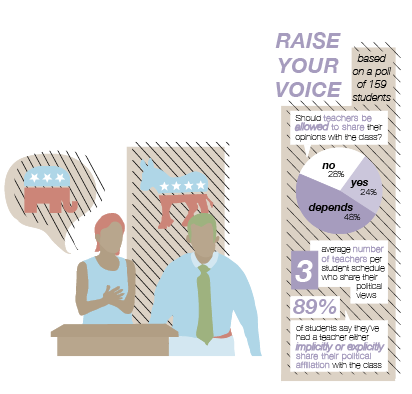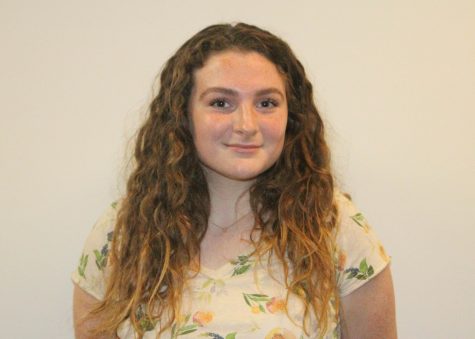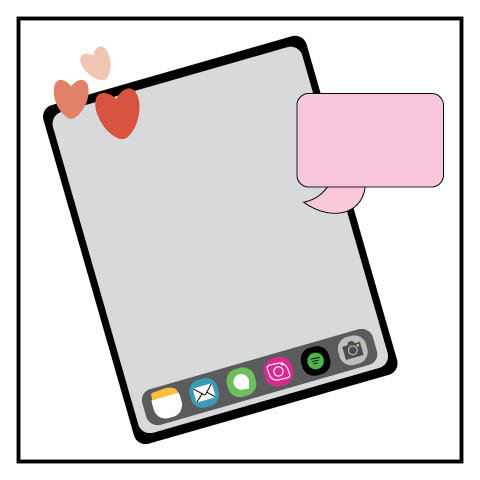Controversy in Curriculum

 Teacher opinions don’t have a place in the classroom
Teacher opinions don’t have a place in the classroom
Teachers have the ability to shape minds. They have the ability to influence students and help them make choices.
That influence should not extend to political or moral grounds.
Especially surrounding the election, many teachers have shared their opinions despite having a duty to stay neutral when speaking to students.
Some teachers do a great job of staying nonpartisan and indifferent while in the classroom — others do not.
There is a difference between providing facts in order for students to make their own conclusions and pressuring students to agree with personal agendas.
Usually, I agree with teacher’s views. I have a liberal mindset — that doesn’t mean I think it’s OK for teachers to contribute their personal views in lectures.
It’s typical to see students become tense when politics is brought up in the classroom, and for good reason. Teachers are in a unique position where they are able to share their views with the class, but most students feel uncomfortable refuting those beliefs because the instructor is their superior.
A teacher’s job is to administer factual information with explanations of what it is — that does not include whether they like it, why they think it’s happening or how it affects them, their children or any aspect of their life. Presenting information in the classroom has become a way for some teachers to sway students’ opinions. As far as I know, students being persuaded isn’t the point of school.
It’s frankly inappropriate for teachers to participate in opinionated discussions among students within the classroom.
Encouraging intelligent conversations between students on politics, social issues and morals is a good thing — teachers injecting themselves into the conversation is not.
Encouraging decision-making based on facts is good — implementing bias in a place of learning is not.
Finding time outside of the normal classroom setting — before school, Tiger Paws, after school, even an email — is a more appropriate way for students who want to engage in biased discussions to do so. Class time is meant for actual curriculum, it’s not a place where teachers should voice their opinion on politics or morals.
If a student wants to talk with a teacher about his or her personal beliefs, it shouldn’t happen during class. Not everyone wants to be a part of that discussion, and some students don’t care for controversial topics.
Teacher perspectives welcome in school setting
Do you know who your teachers voted for in the last presidential election?
Can you guess how your math teacher feels about Black Lives Matter or what your social studies teacher’s position on the travel ban is?
Most of us have teachers who, if not directly, have indirectly stated their political leaning in one way or another during a lesson.
As educators, teachers have a unique position of power.
Although it should not be abused, teachers should be able to use this platform to open discussion surrounding current events.
When teachers inject their personal opinions and seemingly-off-track life lessons, they foster a necessary learning opportunity in the classroom.
For some students, teachers are the most influential adult figures in their lives.
When teachers share their thoughts on real-world issues and allow for students to respond, students have the opportunity to either grow in or reconsider their beliefs while learning the lifelong important skills necessary for having civil discussions.
Teachers can also bring relevance to lessons to help us better understand them.
Perhaps you learn about the importance of immigration control in history class or how the media utilizes leading questions to skew poll results in a psychology class.
In a world flooded with fake news, further perpetuated by our use of social media, it can be refreshing to hear perspectives from educated and honest teachers who have our best interest in mind.
This discussion can help us figure out where we stand on different subjects — even when we don’t agree with their viewpoints.
Being informed on diverse perspectives concerning modern-day issues can help to curb the number of future straight-ticket voters in America.
And as students, we also have a job — we need to try to learn from their thoughts, think critically about what they say and question things that don’t make sense.
Teachers are people who students look up to as their role models, and it is important that, as long as they don’t abuse their privilege, they are free to speak out on their personal and political ideas.
In the real world, we will all face people we agree with and people we don’t. It’s important we learn now how to handle those situations properly.

Charlotte Rooney is a senior and the opinion editor for “The Tiger Print.” She loves writing opinions about current events and writing news stories...






